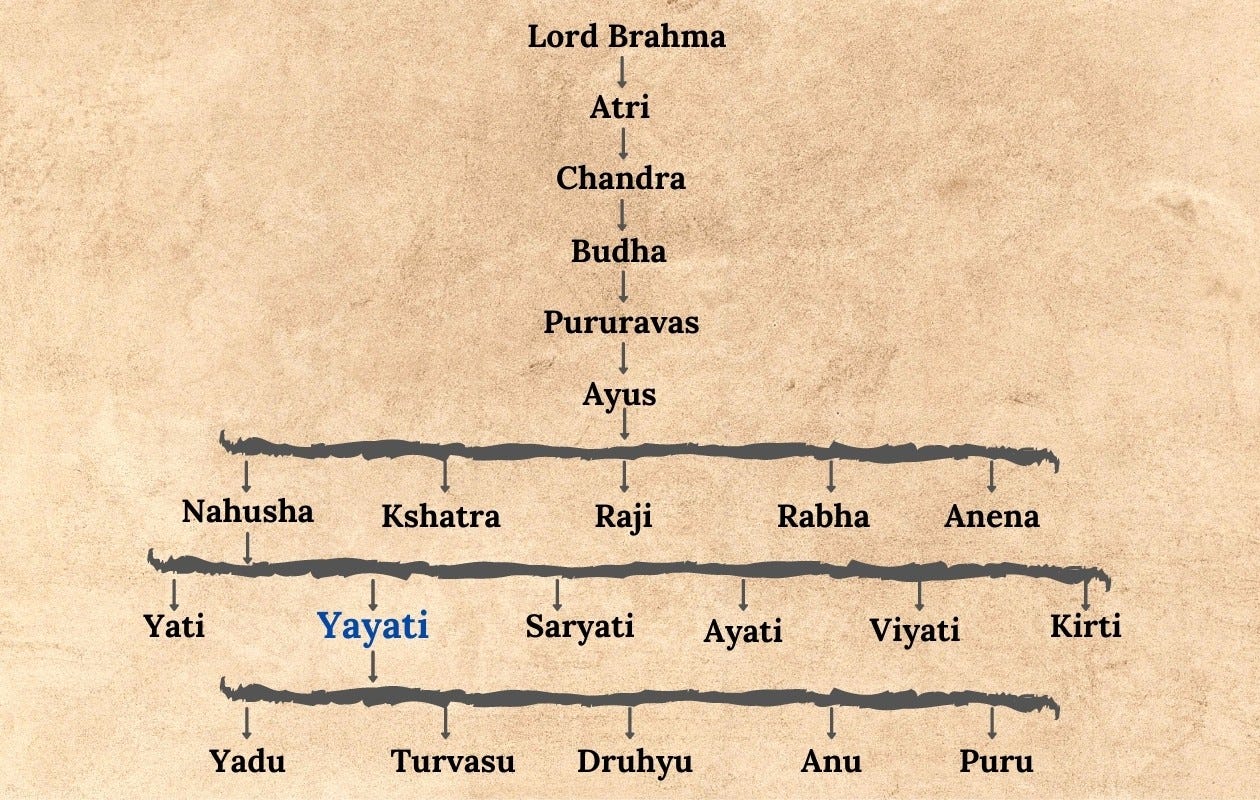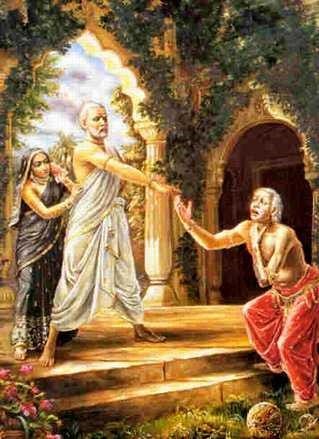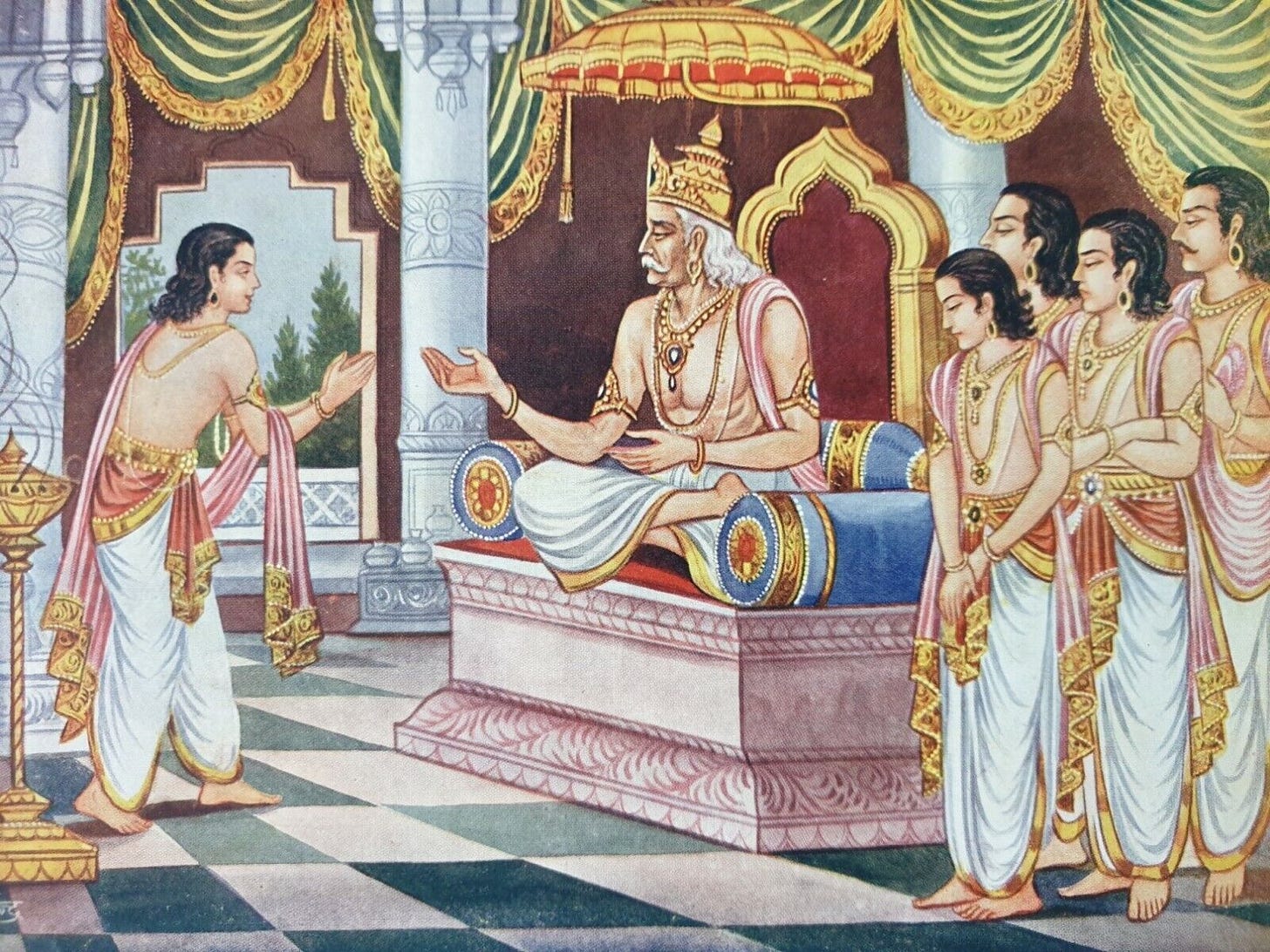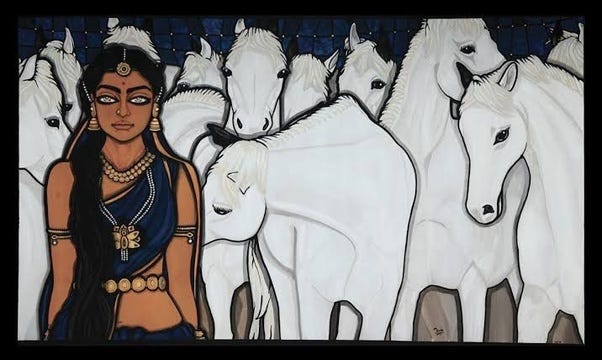Dear Readers,
In the last episode, I introduced you to King Janmejaya, the great-grandson of Prince Arjuna. Upon learning that his father was killed by the Naga leader Takshak, Janmejaya decided to organize the Sarpa-Satra. It was a yagna that demanded the sacrifice of Nagas of the land. The yagna was stopped by Astika who persuaded Janmejaya to forgive Takshak for his deeds. The king spared Takshak’s life but wanted to know the reason behind his actions. On his demand, the great sage Vaishampayana tells Janmejaya the story of his ancestors, The Mahabharata.
Vaishampayana takes Janmejaya down the lane of history and begins with the story of Yayati.
Yayati was the second son of King Nahusha1. Yayati ascended the throne when Yati, his elder brother abdicated the throne and took up asceticism. Yayati was an ambitious king. He conquered the whole of Aryavarta and established himself as the most powerful king.
One day, while passing through the forest, Yayati came across a beautiful maiden in the forest. She was Devayani, the daughter of Shukracharya (the guru of Asuras). Yayati fell in love with Devayani and proposed marriage to her. Devayani agreed. With Shukracharya’s blessings, the two got married. While leaving for her husband’s home, Devayani insisted on taking her maid, Sharmishtha along2. Sharmishtha was the Asura princess who was serving a punishment as Devayani’s maid. Bound by duty, Sharmishtha went with Devayani.
Soon, Sharmishtha caught Yayati’s eye. Even though he was married to Devayani, Yayati couldn’t stop himself from falling for Sharmishtha. The two began a clandestine affair and later Yayati married Sharmishta secretly. Soon Devayani gave birth to two sons; Yadu and Turvasu. Sharmishtha, too, gave Yayati three sons; Druhyu, Anudruhyu, and Puru.
For all this time, Sharmishtha had kept her marriage a secret from Devayani and pretended that the palace guard was her lover. But one day, Devayani heard Puru refer to Yayati as ‘father’. She understood the reality. In a fit of anger, Devayani went to her father and complained. Shukracharya couldn’t bear the tears of his daughter. He cursed Yayati for his infidelity. As an effect of that curse, Yayati started aging prematurely. Desperate to not lose his youth, Yayati begged forgiveness from Shukracharya. His pitiful state melted Shukracharya’s heart. He told Yayati that the curse cannot be recalled but there was one solution. Yayati could exchange his old age for the youth of one of his sons if they agree to it
Yayati called all five of his sons and asked them for this favor. Yadu, the oldest, denied Yayati for this was against the natural order. Following Yadu, the other three also denied it. Puru, the youngest, agreed to bear the weight of his father’s curse. And so, the young Puru transformed into an old man as his father gained youth.
For years, Yayati remained youthful and enjoyed the pleasures of life. But as time passed Yayati realized that the pleasures of youth are fleeting and it is permanence that the soul demands. Realizing the truth of life, Yayati called Puru and gave him his youth back. For the remaining years, Yayati reigned as a virtuous king and his glory reached the ends of the earth. When the time came for him to depart, Yayati crowned Puru as the heir to his throne. Yadu was cursed to never be a king. Neither him nor any of his descendants would ever be kings.
But the story does not end here.
Apart from five sons, Yayati also had a daughter named Madhavi. Madhavi was a beautiful girl who was blessed to give birth to four sons who will be kings.
One day, a rishi named Galav, came to Yayati’s court. He asked the king to give him eight hundred horses which he would present to his guru as guru dakshina3. Yayati did not have eight hundred horses at that time. Not wanting to lose his reputation as the greatest king of all time, Yayati asked Galav to take his daughter. He suggested that Galav can present Madhavi to four kings who are in need of an heir and demand two hundred horses from each of them in lieu of a son.
Galav took Madhavi along with him and presented her to three kings. One after the other, Madhavi gave birth to three sons. Then Galav took her to his guru Vishwamitra along with six hundred horses. Galav presented the horses and Madhavi to Vishwamitra and told him that Madhavi will give him a son who shall be in lieu of the remaining two hundred horses. Vishwamitra accepted Galav’s proposal. Madhavi stayed in Vishwamitra’s ashram and gave birth to a son. After the birth of his son, Vishwamitra asked Madhavi to go back to her father’s house.
Madhavi returned to Yayati’s palace. There was extreme anger in her heart for her father. To get rid of this rage, Madhavi retired to the forest and started practicing asceticism.
When Yayati ascended to heaven, he was welcomed in Indra’s court. After some time though, the gods threw Yayati out. They said that Yayati had exhausted all of his merits. Yayati fell into the forest where Madhavi sat meditating. Seeing her father, fallen like this, Madhavi took pity on him. She took Yayati to her four sons and asked her sons to give a quarter of their merits to their grandfather. This way Yayati would be able to ascend to heaven again.
Madhavi’s sons, who were now kings, initially refused. They asked Madhavi why she was doing this for a man who prostituted her for the sake of his own reputation. Madhavi answered them that she had forgiven her father for his wrongdoings. She demanded that they concede to her request as she was their mother. The sons understood her devotion and collectively donated a quarter of their merits to Yayati. With the help of these merits, Yayati ascended to heaven again.
This is the first story that Vaishampayana narrates to King Janmejaya. Yayati was Janmejaya’s ancestor. His actions affected his children the most. In fact, his children were the ones to truly bear the weight of his actions.
This story takes extreme relevance in today’s time. It tells the parents that you cannot put the weight of your ambitions and dreams on your children. They are individuals with their own set of dreams and ambitions. They should be allowed to carve a niche for themselves. To the children, it says that you can too give life to your parents. Mostly they don’t have any demands. But if they do, it is the duty of a child to fulfill it.
Another important thing that the story underlines is that parents should always give priority to their child’s happiness over the norms and expectations of society. By doing the opposite, you will push the child away from you to no point of return. They might forgive you for your actions but they will never forget that you gave importance to the expectations of unknown people and not to their happiness.
This way, the story gives us the foundation of the strongest relationship in the world. Through Puru, the epic teaches that a dutiful son will always earn merit. Through Madhavi, the epic teaches that a dutiful daughter will earn more merit than her parents. It teaches that parents need to value their daughters as much as they value their sons. If the son has the power to better your life, a daughter has the power to better your afterlife.
Dear readers, this is my learning from this story. What’s yours? I would love to know your take on this story. Do share your views in the comments.
King Nahusha was the third king in the Chandravanshis, the lunar dynasty.
This was Devayani’s way to humiliate Sharmishta. Please follow this space to know the story behind this.
The fee paid to the teacher in ancient times. This could be anything the teacher asks for.







This reminds me of ramayan. Where in one of the versions on television it was shown that Dashrath s first child was a daughter Shanta. To conduct the yagya for getting a son the Rishi had to be married. He was single because he lived in dense forests and was not good looking or something like that. So dashrath wanted to marry his daughter to him. Kaushalya, her mother was not willing. When the Shanta came to know of Dashrath s sorrow of not having a son she volunteered to get married to that Rishi. And she comes with him to conduct the yagya in the palace after marriage
oh my god, firstly, it's sooo good to hear this story in your voice, feels like I'm once again taking a life changing lecture from you in a class.
and secondly, your narrative and decision to underline Madhavi's story with such prominence reminded me of Divakaruni's Palace of Illusions. I truly believe that there are many heroines in our epics whose storylines and lives deserve justice. Only writers like you are capable of doing that. Can't wait to read the upcoming episodes!